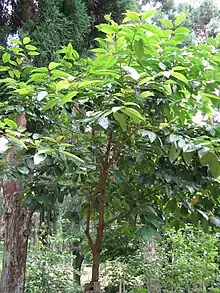Prunus zippeliana
Prunus zippeliana or big leaf cherry (Chinese: 大叶桂樱, Da ye gui ying) is a species of Prunus native to China, Japan, and Vietnam.[2] Individuals have been found in Thailand.[3] It prefers to grow in mixed forests and thickets on calcareous mountains 400 to 2400 m above sea level. In a 1994 study, P. zippeliana was found to be the best in the genus Prunus at preventing melanin synthesis.[4] It is an important winter host plant for Asphondylia yushimai, the soybean pod gall midge, which is a major pest of soybeans in Japan.[5]
| Prunus zippeliana | |
|---|---|
 | |
| Scientific classification | |
| Kingdom: | Plantae |
| Clade: | Tracheophytes |
| Clade: | Angiosperms |
| Clade: | Eudicots |
| Clade: | Rosids |
| Order: | Rosales |
| Family: | Rosaceae |
| Genus: | Prunus |
| Species: | P. zippeliana |
| Binomial name | |
| Prunus zippeliana | |
| Synonyms[1] | |
| |
Description
P. zippeliana is a tree usually about 10 to 25 m tall, occasionally reaching 30 m. Its dusty gray and green bark has a tendency to flake off in patches, exposing the orange-red underbark, which then changes colors as it weathers, producing quite a dramatic effect in some specimens. Its large leathery leaves are borne on a 1 to 2 cm petiole. It flowers July through October and fruits in the winter. Its white flowers are borne on racemes, and are typically 5 to 9 mm in diameter. The flowers have 20 to 25 stamens. The fruits are brownish black.
References
- "Prunus zippeliana Miq". The Plant List. Retrieved 29 December 2016.
- "Laurocerasus zippeliana". Flora of China. Retrieved 3 April 2018.
- Maxwell, J.F. (1991) Botanical Notes on Vascular Flora of Chiang Mai Province, Thailand : 2 NAT. HIST. SIAM SOC 39: 71-83
- Matsuda, H; Nakamura, S; Kubo, M (1994). "Studies of cuticle drugs from natural sources. II. Inhibitory effects of Prunus plants on melanin biosynthesis". Biological & Pharmaceutical Bulletin. 17 (10): 1417–1420. doi:10.1248/bpb.17.1417. PMID 7874069.
- Vacante, Vincenzo; Kreiter, Serge (December 2017). Handbook of Pest Management in Organic Farming. CAB International North America. p. 257. ISBN 9781780644998.